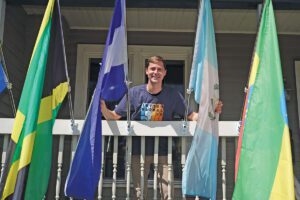
As quarantine protocols eased in 2021, Tucker Rossmaessler took a trip that sparked an idea.
At the Traverse City Summer Microbrew & Music Festival, he and his friends happened upon a “silent disco” tent. His first response to people unaccountably singing, dancing, and screaming was “What is this?” After donning headphones, hearing music—maybe the Spice Girls?—and joining in, his question was “Why doesn’t Ann Arbor have this?”
Now it does: Last fall, Rossmassler launched Whoa Silent Disco into the city’s slowly rebounding social scene. They started at outdoor gatherings such as Thursday nights at Liberty Plaza, then moved inside for events like Bløm Meadworks’ FoolMoon celebration last month.
“It’s like when you see someone singing in their car” or “wedding reception dancing,” said Rossmaessler when asked about the allure of dancing to music only those wearing headphones can hear. Bløm’s party revealed another plus: People at the bar chatted comfortably—no yelling over music—while a few feet away people danced, sang, and chatted under disco lights, switching headphone channels to sync their music, or not. Rossmaessler offers three standard playlists—he likes 1980s, Motown, and hip-hop—but he can create anything, working for hire or on donation, as he did for the U-M Dance Marathon this spring.
As Bløm’s FoolMoon scene wound down, Rossmaessler and colleague Jay Logan marveled at the experience. “This is the biggest crowd I’ve seen in a decade,” Logan said.
—
Despite his obvious enthusiasm for silent disco, Rossmaessler would rather talk about how Covid quarantines affected some of the world’s poorest workers: the scavengers who pick through unregulated garbage dumps for things to sell or use. “I’ve seen kids literally running and jumping on the back of trash trucks coming in,” Rossmaessler says, “to get the best spot to see what’s being dumped and claiming it.”
As Covid spread, dumps around the world closed, leaving an estimated fifteen million people without a livelihood. In the Buen Samaritano community of Tegucigalpa, Honduras, 2,000 people lost their income for three months. To compound the problem, the community lacked a consistent water source, relying instead on rain barrels and delivery trucks that sold unsanitary water.
Rossmaessler, thirty-five, is director of engagement at International Samaritan, an Ann Arbor–based nonprofit that serves Buen Samaritano and other garbage-dump communities in developing nations. “IntSam” is best-known locally for its headquarters, a house on the corner of Summit and N. Main whose front porch flies seven international flags—Ethiopia, Honduras, Guatemala, Jamaica, Nicaragua, and recently added Kenya and Uganda.
Fr. Don Vettese founded what was then called Central American Ministries in 1995, after a mission trip van rerouted through a garbage dump community in Guatemala City. He chose Ann Arbor as home base because of his Washtenaw County roots and the university town’s vast resources. Today Vettese’s successor, Mike Tenbusch, leads a much expanded staff working to break the cycle of generational poverty by providing scholarships for young people who demonstrate great financial need, academic promise, and a desire to help their community.
IntSam scholars also receive holistic support to address the desperate poverty that drove their families to the dump. “It’s food with education, accountability, mentorship, health and wellness programs, and our urgent needs fund,” Rossmaessler says. Local leadership is crucial. “The people are resilient. The drive that these communities have, when they have an opportunity, they give back.” One group of scholars pooled money left over from their awards to buy food for their neighbors.
An endowment covers U.S. operating expenses, so every dollar Rossmaessler raises goes directly to scholars, their families, and international team members’ salaries. “We are doing wire transfers every day, every week, all over the world,” he says—averaging $3,140 annually for 800 scholars.
Rossmaessler tempers his gregarious, confident demeanor with the humility of someone familiar with community service and those who doggedly provide it. Born and raised in Fenton, he got an education degree at EMU; teaching in Singapore after graduation he felt a call to global citizenship. After two years there, Rossmaessler and his wife, Alex, settled in Ann Arbor—the place where they met and he has loved since his older brother attended U-M. They chose to raise their three children here, he says, for the town’s local atmosphere and global perspective. “It’s the world, here in Ann Arbor,” he says.
Two eye-opening campus ministry trips to Tijuana’s garbage-dump community inspired his interest in IntSam, and he joined its staff in 2020. During the pandemic, as he built Whoa Silent Disco and raised money for garbage-dump communities, Alex balanced nursing at Mott Children’s Hospital, online learning support for their oldest, and extensive leadership duties at the co-op preschool their younger children attended.
—
He’s on a mission. “We’re the best-kept secret in Ann Arbor,” he says, “but we’re not trying to be.”
A recent project targeted Buen Samaritano’s water problem. In response to IntSam’s well-meaning dissemination of Covid safety protocols, scholars replied, “The water makes us sick. How are we supposed to stay healthy if we can’t safely wash our hands?”
The answer came last fall with the third annual IntSam Global 5K. Each year, teams of families, churches, schools, and businesses hold local races to raise money for a specific goal—tablets for remote learning, food to ease pandemic shortages, and in 2022, safe water. Groups have a website presence and members of the global IntSam team participate with runners everywhere, from Ann Arbor to Addis Ababa. Last year’s goal was $250,000.
Rossmaessler credits the repeated generosity of donors in the community, such as St. Mary Student Parish. Even so, they were $100,000 short as the three-week race window closed, with the groundbreaking deadline for the project looming. Enter longtime Ann Arbor developer and philanthropist Bill Martin, who stepped up and donated the remainder in honor of Ken Coleman, husband of former U-M president Mary Sue Coleman. Now 400 homes have water filters and connect by pipeline to a new water tower whose inscription reads “Con gratitud a Dr. Ken Coleman. ¡Vamos Azul!”

